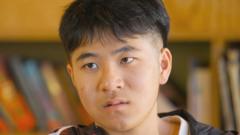In recent years, China has witnessed a concerning resurgence in the practice of using psychiatric hospitals to detain dissenters—a trend that echoes longstanding allegations of state abuse against individuals who challenge the ruling Communist Party. Julia Sheng's story sheds light on this alarming phenomenon of coercive mental health treatment aimed at silencing critics.
When 17-year-old Zhang Junjie protested outside his university in 2022 against China's stringent lockdown measures, he was soon detained and transported to a psychiatric hospital under dubious pretenses. During a consultation disguised as a "Covid test," Junjie was subjected to coercive treatment, including being restrained and administered psychiatric drugs without his consent. "They tied me to a bed and said my views were indicative of serious mental illness,” Junjie recounted during his interview with the BBC.
This alarming trend has affected scores of individuals who have dared to speak out against government policies. Junjie, who later fled to New Zealand, is one of at least 59 identified by the BBC who have experienced similar unjust hospitalizations after protesting. The legal framework that theoretically safeguards against such abuses, including China’s 2013 Mental Health Law, is increasingly rendered ineffective in practice.
Legal expert Huang Xuetao attributes this resurgence to a weakening civil society and an eroded system of oversight. "The police want power while avoiding responsibility; anyone aware of the system's shortcomings can exploit it," he stated, revealing serious gaps in accountability.
Another activist, Jie Lijian, echoed Junjie's trauma, recounting his own forced hospitalization following a protest in 2018. He described a harrowing 52-day ordeal involving coercive drug treatments and electroconvulsive therapy. Both Junjie and Jie highlight the traumatic psychological effects of such treatments, which they claim were politically motivated.
Despite the acknowledgment of these issues by human rights advocates, victims like Mr. Li, who sought to challenge his wrongful psychiatric diagnosis, have faced insurmountable legal hurdles. Their attempts for justice have largely been thwarted, reflecting a broader climate of impunity for state-sanctioned abuses.
The narrative is compounded by the troubling fate of vlogger Li Yixue, who has faced hospitalization after making allegations against police officers. Her case exemplifies the risks faced by those who dare to voice dissent in a country where psychiatric detention is weaponized to maintain control.
The Chinese government asserts that improvements are needed to prevent unlawful detentions, yet systemic issues remain pervasive. The current landscape illustrates the dangers of intertwining state power with mental health systems, where dissenting voices are silenced under the guise of psychiatric care. As the situation evolves, the global community watches closely, seeking accountability and an end to these violations of basic human rights.
When 17-year-old Zhang Junjie protested outside his university in 2022 against China's stringent lockdown measures, he was soon detained and transported to a psychiatric hospital under dubious pretenses. During a consultation disguised as a "Covid test," Junjie was subjected to coercive treatment, including being restrained and administered psychiatric drugs without his consent. "They tied me to a bed and said my views were indicative of serious mental illness,” Junjie recounted during his interview with the BBC.
This alarming trend has affected scores of individuals who have dared to speak out against government policies. Junjie, who later fled to New Zealand, is one of at least 59 identified by the BBC who have experienced similar unjust hospitalizations after protesting. The legal framework that theoretically safeguards against such abuses, including China’s 2013 Mental Health Law, is increasingly rendered ineffective in practice.
Legal expert Huang Xuetao attributes this resurgence to a weakening civil society and an eroded system of oversight. "The police want power while avoiding responsibility; anyone aware of the system's shortcomings can exploit it," he stated, revealing serious gaps in accountability.
Another activist, Jie Lijian, echoed Junjie's trauma, recounting his own forced hospitalization following a protest in 2018. He described a harrowing 52-day ordeal involving coercive drug treatments and electroconvulsive therapy. Both Junjie and Jie highlight the traumatic psychological effects of such treatments, which they claim were politically motivated.
Despite the acknowledgment of these issues by human rights advocates, victims like Mr. Li, who sought to challenge his wrongful psychiatric diagnosis, have faced insurmountable legal hurdles. Their attempts for justice have largely been thwarted, reflecting a broader climate of impunity for state-sanctioned abuses.
The narrative is compounded by the troubling fate of vlogger Li Yixue, who has faced hospitalization after making allegations against police officers. Her case exemplifies the risks faced by those who dare to voice dissent in a country where psychiatric detention is weaponized to maintain control.
The Chinese government asserts that improvements are needed to prevent unlawful detentions, yet systemic issues remain pervasive. The current landscape illustrates the dangers of intertwining state power with mental health systems, where dissenting voices are silenced under the guise of psychiatric care. As the situation evolves, the global community watches closely, seeking accountability and an end to these violations of basic human rights.



















